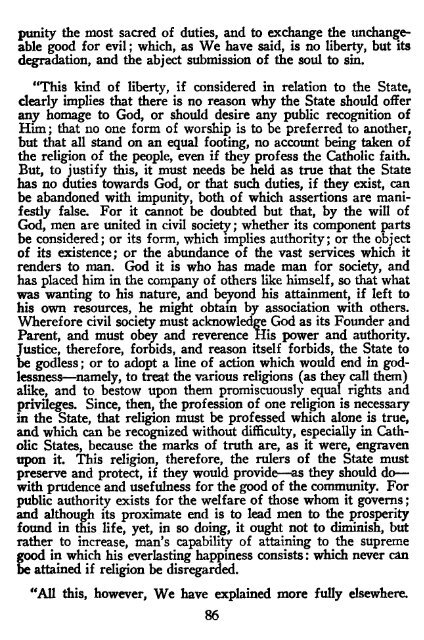B_345_The-Rulers-of-Russia
B_345_The-Rulers-of-Russia
B_345_The-Rulers-of-Russia
Create successful ePaper yourself
Turn your PDF publications into a flip-book with our unique Google optimized e-Paper software.
punity the most sacred <strong>of</strong> duties, and to exchange the unchangeable<br />
good for evil; which, as We have said, is no liberty, but its<br />
degradation, and the abject submission <strong>of</strong> the soul to sin.<br />
"This kind <strong>of</strong> liberty, if considered in relation to the State,<br />
clearly implies that there is no reason why the State should <strong>of</strong>fer<br />
any homage to God, or should desire any public recognition <strong>of</strong><br />
Him; that no one form <strong>of</strong> worship is to be preferred to another,<br />
but that all stand on an equal footing, no account being taken <strong>of</strong><br />
the religion <strong>of</strong> the people, even if they pr<strong>of</strong>ess the Catholic faith.<br />
But, to justify this, it must needs be held as true that the State<br />
has no duties towards God, or that such duties, if they exist, can<br />
be abandoned with impunity, both <strong>of</strong> which assertions are manifestly<br />
false. For it cannot be doubted but that, by the will <strong>of</strong><br />
God, men are united in civil society; whether its component parts<br />
be considered; or its form, which implies authority; or the object<br />
<strong>of</strong> its existence; or the abundance <strong>of</strong> the vast services which it<br />
renders to man. God it is who has made man for society, and<br />
has placed him in the company <strong>of</strong> others like himself, so that what<br />
was wanting to his nature, and beyond his attainment, if left to<br />
his own resources, he might obtain by association with others.<br />
Wherefore civil society must acknowledge God as its Founder and<br />
Parent, and must obey and reverence His power and authority.<br />
Justice, therefore, forbids, and reason itself forbids, the State to<br />
be godless; or to adopt a line <strong>of</strong> action which would end in godlessness—namely,<br />
to treat the various religions (as they call them)<br />
alike, and to bestow upon them promiscuously equal rights and<br />
privileges. Since, then, the pr<strong>of</strong>ession <strong>of</strong> one religion is necessary<br />
in the State, that religion must be pr<strong>of</strong>essed which alone is true,<br />
and which can be recognized without difficulty, especially in Catholic<br />
States, because the marks <strong>of</strong> truth are, as it were, engraven<br />
upon it. This religion, therefore, the rulers <strong>of</strong> the State must<br />
preserve and protect, if they would provide—as they should do—<br />
with prudence and usefulness for the good <strong>of</strong> the community. For<br />
public authority exists for the welfare <strong>of</strong> those whom it governs;<br />
and although its proximate end is to lead men to the prosperity<br />
found in this life, yet, in so doing, it ought not to diminish, but<br />
rather to increase, man's capability <strong>of</strong> attaining to the supreme<br />
good in which his everlasting happiness consists: which never can<br />
be attained if religion be disregarded.<br />
"All this, however, We have explained more fully elsewhere.<br />
86





